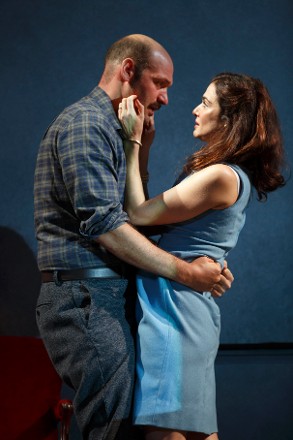Plenty
by Elizabeth Ahlfors

Rachel Weisz and Corey Stoll in Plenty. Photo by Joan Marcus
Reviewed by Elizabeth Ahlfors
Plenty, David Hare's post-World War II play focusing on the dark years of Susan Traherne, returns to the New York Public Theater starring Rachel Weisz, looking stylish and world-weary. Because Susan's thrilling espionage work ended after the war, the following decades were disappointingly empty and depressing for her. No longer a heroic warrior, according to playwright David Hare, Susan exemplifies a female society left unacknowledged and unappreciated in peacetime.
Plenty is not a linear play. It opens in 1962, years after the war, with Susan's husband, Raymond Brock, a diplomat, passed out naked and bloody on the floor of their home, kayoed after a Scotch-and-Nembutal cocktail she gave him. Brock (Corey Stoll) is a decent husband but too lackluster for Susan and she is about to leave him. After he passes out, she gives the deed to the house to her unconventional fancy-free friend, Alice (Emily Bergl), to use as an unwed mothers’ shelter and then Susan takes off.
Flashback to 1943 and the French countryside when 17-year-old Susan, young and idealistic, joins the Resistance. While the entire play covers almost two decades, after the war ends, Susan returns to England with her early heroism dissipating. Without the intrigue of working as a British Special Operations courier with the French Resistance, her life in England loses its verve and she never finds her footing in civilian life and slips into mental fraction.
As Hare tells Susan's story, he also depicts the problems and disappointments of postwar England, especially for women. Susan develops poise and sophistication within the isolation of what she considers a colorless, morally bankrupt society that will not let women express their abilities. Remembering the excitement of the war years, she grows increasingly self-absorbed and unstable. She marries Brock but he fades in her shadow, watching her erratic behavior.
Susan was not alone in her peacetime frustration. In a program note, Hare (Skylight) comments, "(Women's) work in the war had left them either with memories or expectations which made it very hard for them to settle back into civilian life."
Despite Weisz' finely tuned performance and aggressive energy in this emotionally demanding role, it's hard to accept the depth of Susan and Brock's relationship and any sexual magnetism. This shadows much of the play and hinders Stoll's interpretation as Susan's long-suffering husband. Supporting players include Emily Bergl, a frothy perk as Alice, and LeRoy McClain plays Mick, Susan’s fling in her failed effort to have a child. Byron Jennings is totally persuasive in his dignity as Sir Leonard Darwin, struggling through the crisis of the Suez Canal.
David Leveaux's direction cannot enliven the bleakness of the play, which is not helped by the clumsy scenes shifts. The rotating panels setting designed by Mike Britton are heightened by David Weiner's mood-enhancing lighting. Jess Goldstein designed period perfect costumes, notably a Dior styled suit for Susan when she mingles with the society that she feels is empty.
After 34 years, Rachel Weisz (Betrayal) ignites the part performed on the Broadway by Kate Nelligan in 1982 and later by Meryl Streep on film.
This review also appears in TotalTheater.com
Plenty
The Public Theater
Off Broadway
4 Lafayette Street. NYC
Previewed: Oct. 4, 2016. Opening: Oct. 23, 2016 Closing: Extended to Dec. 1, 2016
Written by: David Hare
Directed by: David Leveaux
Running time: 2 hours. 30 minutes. One intermission
Review by Elizabeth Ahlfors.